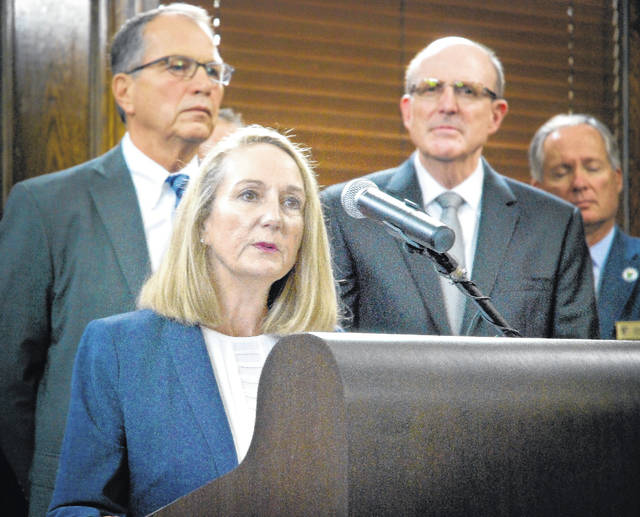
Delaware County elected officials joined the Delaware County Board of Commissioners Thursday in opposition to State Issue 1, an amendment that seeks to add a new section to Article XV of the Ohio Constitution.
“This Amendment would add a new section 12 to Article XV of the Ohio Constitution to reduce the number of people in state prison for low-level, nonviolent drug possession or drug use offenses or for non-criminal probation violations and by providing sentence credits for participation in rehabilitative programs and to direct the savings achieved by such reductions in incarceration to drug treatment programs and other purposes,” states the summary of the initiative petition.
Commissioners unanimously approved and signed a proclamation opposing State Issue 1.
Commissioner Gary Merrell said it is a strong indication of where Delaware County stands on Issue 1 by the outstanding presence of all the elected officials in the commissioners room.
“When people on the east and west coast think they can tell us how we should be doing our job, there is something wrong with that,” he said. “We have a much better feel of what is going on in our local community.
“This does not belong in the Constitution,” he added.
Carol O’Brien, county prosecutor, said she wasn’t going to go into a tremendous amount of detail because she could probably talk for hours on how bad Issue 1 is for the people of Ohio and Delaware County.
“This is very well-intentioned, but a misguided attempt to modify the constitution of the State of Ohio and put in there some points that are better left to the (Ohio) legislator to work on,” she told the commissioners and those in attendance during the regular meeting.
O’Brien added Issue 1 is powered by big out-of-state money with a list of donors that include the likes of Open Society Policy, Washington, D.C.; Open Philanthropy Project, San Francisco; Chan Zuckerburg Initiative, Paleto, California; Tides Advocacy, San Francisco, California; and The Community for Action Fund, Washington, D.C.
“They have contributed almost $4 million,” O’Brien said. “The total amount for Ohio dollars is (only) $19,000 out of that.”
O’Brien said those opposed to Issue 1 consist of the Ohio Prosecuting Attorney Association, Ohio State Bar Association, Buckeye State Sheriff’s Association, Ohio Association of Chiefs of Police, Ohio Auditors, Ohio Recorders, Ohio Clerks, all the associations of the judges, and many other associations and groups.
“In the words of Maureen O’ Conner, ‘This is a disaster,’ a catastrophic disaster for the people of the State of Ohio,” O’Brien said. “It purports to be about treatment, but treatment has actually a small role.”
O’Brien said the first problem with Issue 1 is that it “reduces prison time for dangerous criminals by 25 percent.” She added the crimes included are kidnapping, human trafficking, gross sexual imposition, arson and robbery.
O’Brien said prison times would be reduced for “all felony crimes except murder, rape and child molestation.” She then challenged anyone to find the crime of child molestation in the Ohio Revised Code.
“Because it doesn’t exist,” she said. “It does exist in the California code. The proposal is an almost exact replica of Proposition 49 in California, which is not doing so well.”
O’Brien said passage of Issue 1 will undermine treatment.
“The proponents allege that by transferring the money that is going to be saved from not incarcerating these people, we’re going to get people into treatment,” she said. “It doesn’t happen. It’s unfortunate, but it doesn’t happen.”
O’Brien said California had estimated the state would “save hundreds of millions of dollars annually” by reducing the severity of the crimes, reduce prison populations, and moving to a treatment-based plan. She said Gov. Jerry Brown published that the state of California had saved $29 million.
“It was woefully under what was projected,” she said. “California hasn’t realized the projected savings. The people need help, their not getting help.”
Delaware County Sheriff Russ Martin said he has been on the frontlines for 38 years, and the reality is that the “lethality of the illegal drugs that have been introduced to an opiate-addicted population is a significant problem.”
“This is not a political issue,” he added. “This is a public safety issue.”
Martin said it’s been found that the threat of punishment and incarceration can lead people to seek the alternative of treatment and recovery.
“We have begun to make some significant changes in the rates of recidivism here locally because of the programs we’ve implemented locally in our jail,” he said.
Martin said all of the progress would be lost and set the work that has been done back significantly if the amendment is passed by the people.
“It will make our communities less safe, and it will not address the real issue to the problem,” he said.
Delaware County Judge Everett Krueger said he has set on the bench for nearly 35 years and been the judge that supervises the drug recovery docket for the past seven years.
“If I didn’t have the ability to impose days of incarceration, basically my hands are tied,” he said. “It’s a futile effort.”
Krueger said the amendment goes further than just talking about drug addiction.
“It talks about the ability of judges to hold anybody accountable and be a deterrent to crime that is committed in our community,” he said. “(Judges) will not be able to impose any prison time sentences. On top of that, the department of corrections, which is an executive branch of the government, the third branch of government, is going to tell (the judges) what you can do to the offender.
“There is no question that it will have a disastrous effect,” Krueger added.
The ballot language, the summary, and the full version of Issue 1, along with arguments for and against, can be found on The Ohio Secretary of State’s website at https://www.sos.state.oh.us/legislation-and-ballot-issues/ballot-board/ballot-board-2018/
The full commissioners session on Issue 1 can be viewed at https://www.youtube.com/watch?v=fR8IP7psyoM


